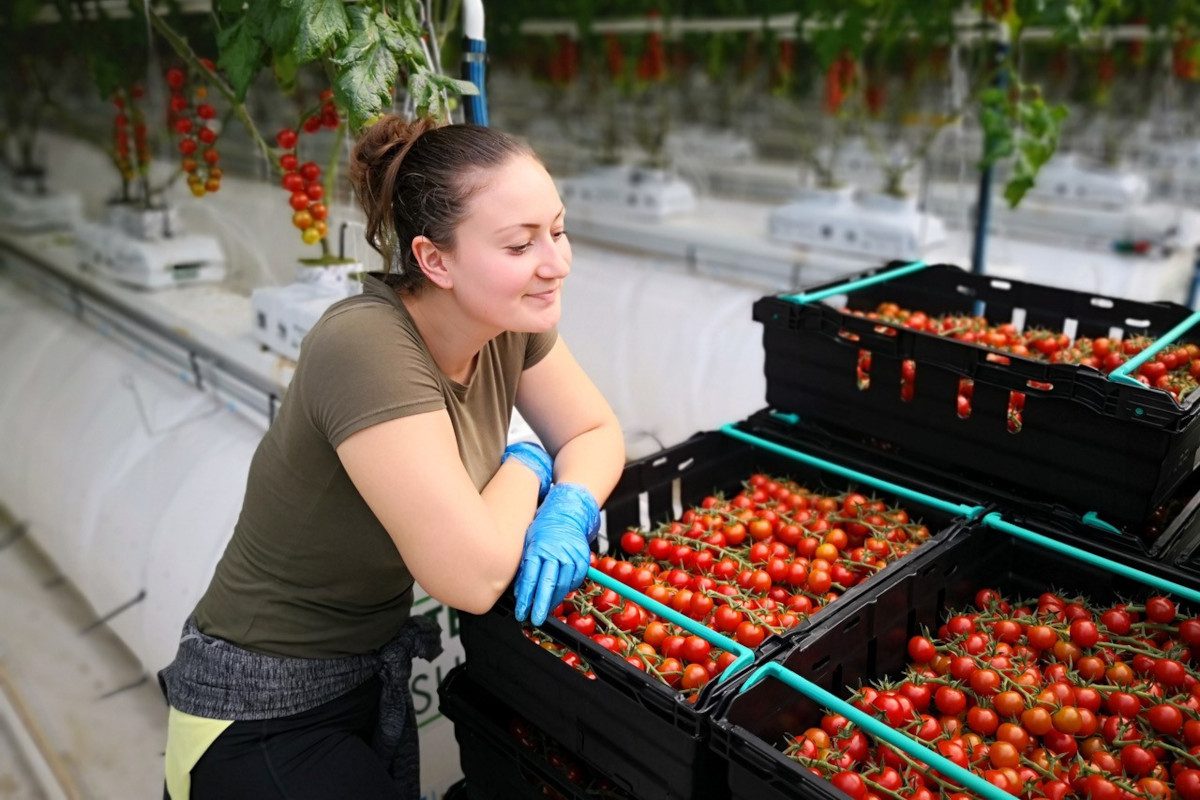
The UK eats over 500,000 tonnes of fresh tomatoes each year but only grows 20% of them here, a state of affairs that commercial tomato-growing firm Sterling Suffolk says it is attempting to address using an unusual glasshouse technology to minimise the environmental impact of the activity.
Based in Bamford, near Ipswich, Sterling Suffolk says its highly efficient, semi-closed glasshouses are the first of their kind in the UK, using “25% less energy per tonne of tomatoes than other conventional glasshouses, while capturing and reusing at least 75% of the CO2 generated from heating”.
This is seemingly achieved using advanced air-exchange systems to precisely control the growing environment, with “a highly efficient hydroponic growing system capable of using 100% recycled water”. Beneficial insects and bacteria are used to control pests. The CO2 from the gas boiler is captured and used by the tomato plants for photosynthesis and it also helps with pest control, says the firm.
An opportunity to invest in the project has just been launched by Abundance Investment, a UK-based ethical investment crowdfunding platform.
Bruce Davis, Cofounder and Managing Director of Abundance Investment said: “Finding scalable ways to cut the environmental cost of the foods we eat most often has to be a priority if we want to feed ourselves more sustainably in the transition to Net Zero. With its innovative eco-friendly production methods, Sterling Suffolk will help consumers buy British tomatoes knowing they are making the best choice they can for the environment too.”
The UK imports most of our tomatoes from gas-heated greenhouses in cool climates like the Netherlands or warmer climates further afield – such as Spain – which benefit from lower heating requirements but have other major environmental impacts, including transport and water usage.
Tomatoes picked abroad also need to ripen in transit and on shop shelves which directly affects nutritional content, flavour and wastage.
Richard Lewis, Managing Director, Sterling Suffolk, said: “We founded Sterling Suffolk to use the latest technology to grow more sustainably for the vast quantities of fruits that we consume in the UK. We passionately believe that our semi-closed glasshouse technology will have a significant part to play in how local and sustainable produce is grown in the UK, and we hope that Abundance investors will join us on our journey.”
Sterling Suffolk was formed in 2014 to operate an advanced glasshouse supplying tomatoes for the UK market through a wholesaler to large retailers.
The business, advised by DUGUUD, is raising up to £6.75 million through Abundance to scale up its operation by building 2.8 hectares of new glasshouses, increasing its growing space by 50% to supply an additional 1,000 tonnes a year of tomatoes for the UK market.
The investment will earn an effective rate of return of 8% a year over the 11-year term via fully regulated, tradable bonds called Debentures and is eligible for inclusion in Abundance’s ISA and SIPP products. Minimum investment is just £5.
The investment can be held for its full 11-year term, or sold on to others via the Abundance Marketplace free of charge at any point during the term.
This is the second sustainable food investment launched by Abundance. In July Global Berry raised £2.6 million on the platform in just two weeks to fund sustainable glasshouses for strawberries.
To find out more about Sterling Suffolk and download an offer document, visit: https://www.abundanceinvestment.com/invest-now/sterling-suffolk







